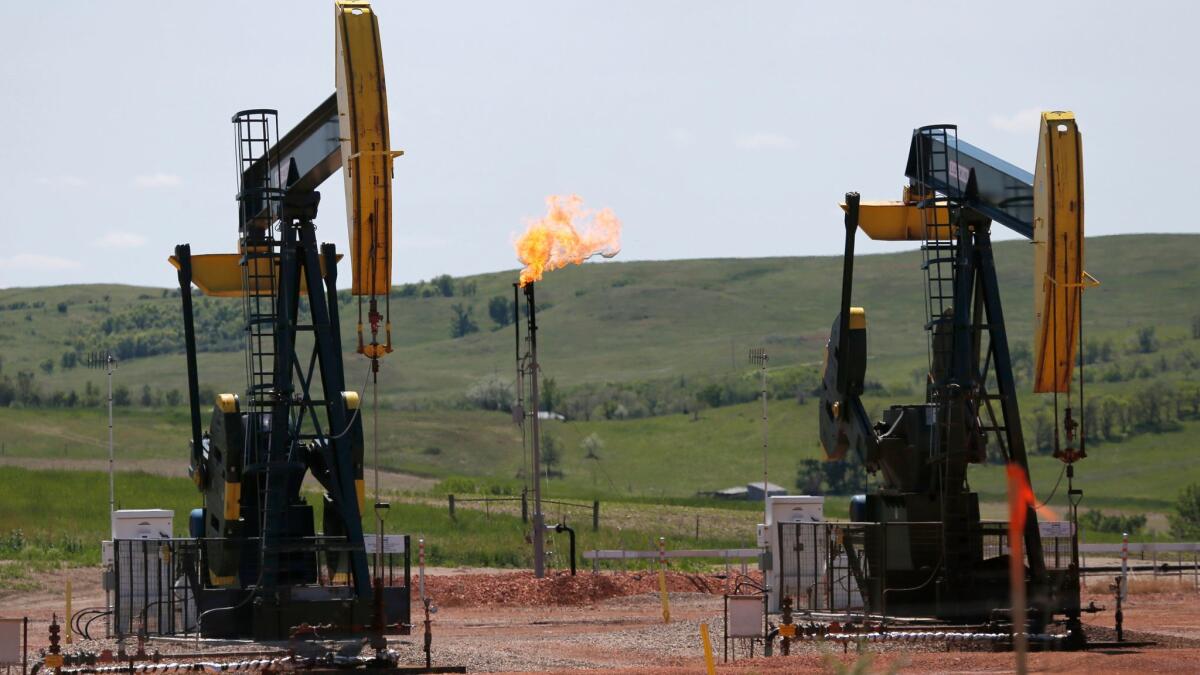Trump and Republicans suffer a rare setback in their campaign to kill Obama-era environmental rules

- Share via
Reporting from Washington — The push by the Trump White House and GOP congressional leaders to dismantle environmental protections hit an unexpected roadblock when the Senate would not go along with plans to kill Obama-era rules limiting the release of a potent greenhouse gas into the atmosphere.
Three Republican senators joined Democrats on Wednesday in blocking the effort to kill a rule that forces energy companies to do more to contain methane leaks at their drilling operations on public land. The vote was a setback for the GOP congressional leadership, which had been confident it could scuttle the rules, and for the Trump administration, which said the restrictions unnecessarily encumber energy firms.
The attack on the methane rule failed amid an uprising in Western states, where tens of thousands of residents near drilling operations risk exposure to the toxic compounds that leak in tandem with the methane.
The collapse of the effort raised the prospect that some moderate Republicans are growing uncomfortable with the aggressiveness with which environmental rules are being rolled back under the current Congress and White House. And it comes at the same time resistance from moderate Republicans has compelled Trump to rethink his vow to withdraw from the Paris agreement on climate change that his predecessor had taken a lead in negotiating.
At issue is 41 billion cubic feet of a greenhouse gas leaking from many of the nearly 100,000 oil and gas wells on federally owned land. Methane is among the most potent accelerators of global warming, 25 times more harmful than carbon dioxide. A swift House vote in March to eliminate an Obama-era Bureau of Land Management rule requiring energy firms to trap the escaping gas and convert it to electricity triggered a public backlash. Several Republican senators wavered on the measure in recent weeks.
“Improving the control of methane emissions is an important public health and air quality issue,” said a statement from Sen. John McCain (R-Ariz.), who joined GOP colleagues Susan Collins of Maine and Lindsey Graham of South Carolina in voting with Democrats to stop the proposal to repeal the nascent rule. “I join the call for strong action to reduce pollution from venting, flaring and leaks associated with oil and gas production.”
McCain said that while he is concerned the methane restrictions are onerous on business, the measure to repeal them threatened to prevent the federal government from taking any new action at all to force the firms to capture the gas.
The Obama administration had concluded the amount of methane escaping each year from drilling operations is enough to provide electricity for nearly 740,000 homes. The Government Accountability Office alerted Congress in July that capturing it would boost royalties owed to taxpayers by $23 million, much of it going to the cash-strapped local communities where the wells are located.
Several Western states already have passed their own laws requiring oil and gas companies to contain the methane aggressively. But the efforts often are undermined by clouds of methane drifting in from neighboring states. Lawmakers got an earful from a broad coalition of businesses, activists and local officials embittered by the concentrations of methane pollution in their communities. Their grievances ran the gamut from methane leaks being America’s second-biggest source of industrial climate change to the stench of the air around drilling sites. More than 80% of the people in Western states, including Arizona, Colorado, Montana, Utah and Wyoming, supported the Obama-era mandate in a Colorado College poll taken in December.
Oil and gas firms vowed they will continue their fight against the rules, which they warn threaten to drive small, family-run energy companies out of business. And Trump’s Department of the Interior made clear that it, too, will be working to undermine the methane regulation it inherited. Kate MacGregor, who oversees land and minerals at the Department of the Interior, said the regulation remains targeted for major revisions or even elimination by the administration, despite the Senate vote.
But without help from Congress, such an effort is laborious, time-consuming and vulnerable to legal action from environmental groups and states.
While the administration talked of Wednesday’s vote in Congress as a minor setback, besieged environmental activists declared that their victory on this obscure regulation pointed to something bigger.
“This shows the tide is starting to change,” said Madeleine Foote, a lobbyist with the League of Conservation Voters. “What they want to do is radical; it is extreme. People are raising their voices about it, and members of Congress are hearing. The resistance is having an impact.”
Follow me: @evanhalper
More to Read
Get the L.A. Times Politics newsletter
Deeply reported insights into legislation, politics and policy from Sacramento, Washington and beyond. In your inbox three times per week.
You may occasionally receive promotional content from the Los Angeles Times.











